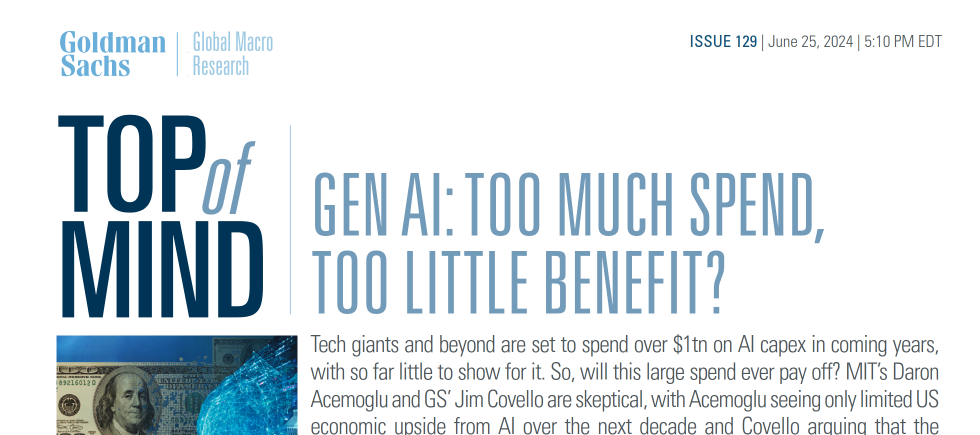In a study published already in June 2024 – which is gaining traction among media recently –, the world’s second largest investment bank titled with “Gen AI: Too Much Spend, Too Little Benefit?“. Goldman-Sachs is highly skeptical whether the huge investments pouring into the cloudy sector of “AI” will ever return a break-even. Tech giants are spending over 1 $tn (for Europeans: More than a billion US dollar) “on AI capex in the coming years, with so little to show so far“.
“So, will this large spend ever pay off? MIT’s Daron Acemoglu and GS’ Jim Covello are skeptical, with Acemoglu seeing only limited US economic upside from AI over the next decade and Covello arguing that the technology isn’t designed to solve the complex problems that would justify the costs, which may not decline as many expect.”
Of course, Goldman Sachs wouldn’t be Goldman Sachs if it didn’t quote some more optimistic voices, too, but the 31-page PDF reads rather like a warning and leaves a clear impression: You may lose your investments, if you don’t pay attention. “Beyond the current “picks and shovels” phase, even if AI’s “killer application” has yet to emerge“, in the current “chips and power shortage“, there are many aspects of the AI / GenAI development that are suitable to make investors frown.

Goldman Sachs conclusion doesn’t seem to help creating confidence in investors, it somewhat sounds rather sarcastic: “But despite these concerns and constraints, we still see room for the AI theme to run, either because AI starts to deliver on its promise, or because bubbles take a long time to burst.”
And even Goldman Sachs senior multi-asset strategist Christian Mueller-Glissmann “finds that only the most favorable AI scenario, in which AI significantly boosts trend growth and corporate profitability without raising inflation, would result in above-average long-term S&P 500 returns, making AI’s ability to deliver on its oft-touted potential even more crucial.“, Editor Allison Nathan reports. The PDF also features a long interview with Daron Acemoglu, Institute Professor at MIT, who argues “that the upside to US
productivity and, consequently, GDP growth from generative AI will likely prove much more limited than many forecasters—including Goldman Sachs—expect. Specifically, you forecast a ~0.5% increase in productivity and ~1% increase in GDP in the next 10 years.”
Jim Covello, Head of Global Equity Research at Goldman Sachs, says his main concern is “that the substantial cost to develop and run AI technology means that AI applications must solve extremely complex and important problems for enterprises to earn an appropriate return on investment (ROI).(…) What $1tn problem will AI solve? Replacing low-wage jobs with tremendously costly technology is basically the polar opposite of the prior technology transitions I’ve witnessed in my thirty years of closely following the tech industry”

Many media have picked up the thread and created interesting and controversial discussions on the topic. Maybe the “AI”/”GenAI” hype has reached a sobering point, a tipping turn. On a visit to Munich Tech Days recently, guests could see more and more experts starting to ask questions like “Wait, what do you mean when you talk about ‘AI’? LLMs, Machine Learning, Speech Synthesis or Pattern Recognition?” A sobering AI fall might be on its way, and that can’t be bad.
